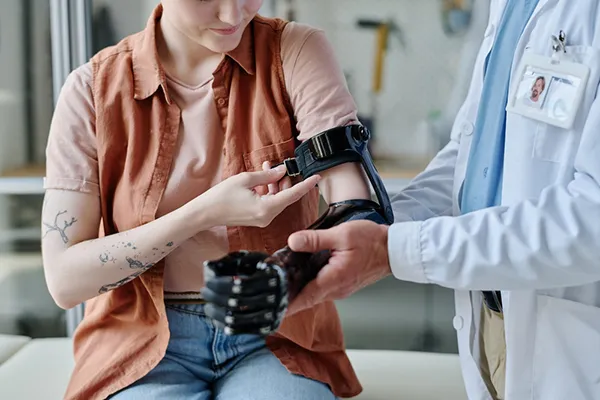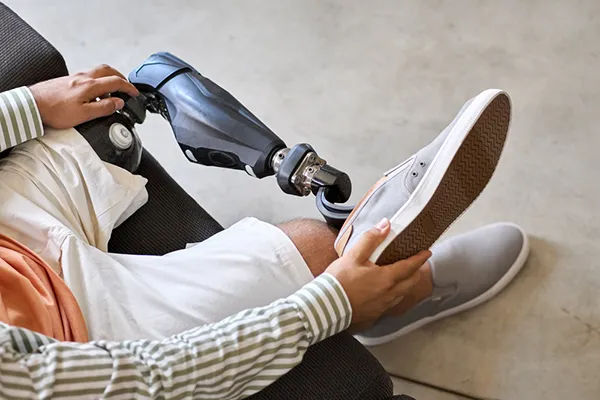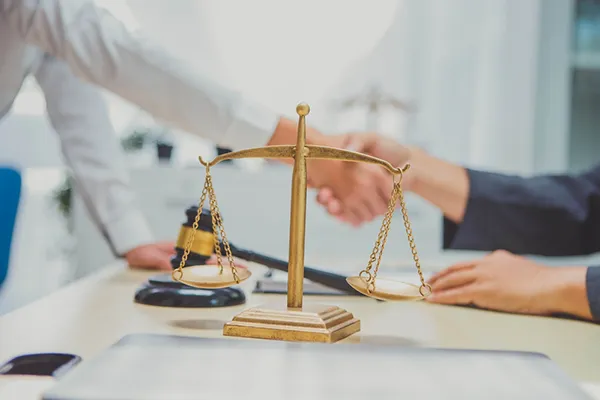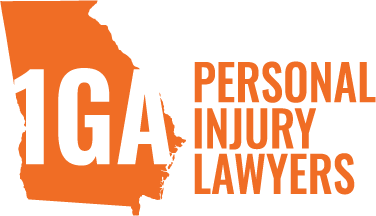Understanding The Loss of a Limb
Loss of a limb is a significant and life-altering event. It can result from severe accidents, medical conditions, or surgical interventions, often leading to an amputated limb with various medical and psychological experiences. Understanding the implications of a loss of limb is crucial for those affected and their families. Such injuries can lead to a range of physical, emotional, and financial challenges.
When a limb is lost, the body undergoes drastic changes. The individual may face the physical pain associated with the injury, along with complications like phantom limb pain or residual limb pain. These sensations can be frustrating and disorienting, making recovery even more challenging. Emotional pain often accompanies these physical challenges. Feelings of grief, anger, and anxiety are common as individuals adjust to life without a body part.
The impact of losing a limb extends beyond the immediate physical and emotional pain. It can lead to significant medical expenses, including surgeries, prosthetic limbs, and ongoing physical therapy. In many cases, individuals may also experience lost wages due to an inability to work, further complicating their financial situation.
Understanding the broader context of limb loss is essential for those navigating this difficult journey. It is not just about the physical injury but also about the holistic approach to recovery and adaptation. Seeking professional support, both medical and legal, can provide the necessary resources to help manage the aftermath of such a traumatic experience.
What Constitutes a Loss of Limb?
A loss of limb refers to the complete or partial removal of an arm or leg. This can occur due to various reasons, including traumatic incidents, medical conditions, or surgical interventions. Understanding what constitutes a loss of limb is crucial for those affected, as it directly impacts their physical and emotional well-being, as well as their legal rights in cases of amputation injury.
Causes and Types of Amputation Injuries
Amputation injuries fall into two main categories: traumatic and surgical. Recognizing the causes and types of amputation injuries is essential. Whether due to trauma or medical intervention, limb loss has profound physical and emotional impacts that can influence recovery and legal options.
Surgical Amputations
Performed for medical reasons, surgical amputations may be necessary to treat severe infections, circulatory problems, or complications from chronic conditions like diabetes. While life-saving, surgical amputations carry risks such as infections, nerve damage, and wound healing complications. Understanding the medical necessity helps patients prepare emotionally and physically for recovery.
Traumatic Amputations
These occur due to severe accidents, such as car crashes, workplace incidents, or agricultural mishaps. Traumatic amputations can result from crushing, severing, or de-gloving injuries and often lead to significant physical and emotional challenges. Victims may face mobility issues, loss of independence, and changes in self-image, requiring specialized rehabilitation and support.
Complications and Challenges Post-Amputation
Understanding these complications is vital for amputees and their families. With the right support and resources, individuals can navigate this difficult journey and work towards reclaiming their quality of life.
Phantom Limb Pain and Residual Limb Pain
A personal injury claim allows you to seek compensation for the damages you’ve incurred due to someone else’s negligence. This could stem from a car accident, a fall, or any incident that resulted in a brain injury. Establishing liability is essential. You must demonstrate that another party’s actions directly caused your injury. Gathering evidence, such as medical records and witness statements, is vital in building a strong case.
Physical Pain
These pain conditions can significantly impact daily life, making it essential for amputees to seek effective pain management strategies. Physical therapy plays a crucial role in recovery, helping individuals regain strength and mobility. Additionally, healthcare professionals may recommend medications or alternative therapies to alleviate discomfort.
Emotional Pain
These pain conditions can significantly impact daily life, making it essential for amputees to seek effective pain management strategies. Physical therapy plays a crucial role in recovery, helping individuals regain strength and mobility. Additionally, healthcare professionals may recommend medications or alternative therapies to alleviate discomfort.
Legal Rights and Compensation for Limb Loss
Losing a limb is life-changing, but you may be entitled to compensation if it resulted from an accident or medical negligence. This can cover medical bills, rehabilitation, prosthetics, lost wages, and future earning potential. Non-economic damages may address pain, suffering, and the emotional impact of limb loss.
Working with an experienced personal injury attorney ensures your rights are protected and helps you pursue a settlement that reflects both the financial and personal effects of your injury.
Pursuing an Amputation Lawsuit: What You Need to Know
If you or a loved one has experienced a loss of limb due to an accident or medical negligence, pursuing legal action may be essential to secure the compensation you deserve. Here’s what to consider when navigating the amputation lawsuit process.
Economic and Non-Economic Damages in Limb Loss Cases
In cases of limb loss, victims can seek both economic and non-economic damages. Economic damages include quantifiable financial losses, such as medical expenses for surgeries, prosthetic limbs, and ongoing rehabilitation.
Non-economic damages cover the emotional and psychological impacts of losing a limb, including pain and suffering, loss of enjoyment of life, and emotional distress.
Medical Expenses and Prosthetic Costs
Medical treatment for amputation injuries can be extensive. This includes hospital stays, surgical procedures, and rehabilitation. Additionally, the cost of prosthetic limbs can be significant.
It’s crucial to document all medical expenses and future costs associated with prosthetic devices as these will be critical in your lawsuit.
Lost Wages and Future Earning Capacity
A loss of limb can severely impact your ability to work. If your injury has resulted in lost wages or diminished future earning capacity, you can include these losses in your lawsuit.
This aspect requires careful calculation to demonstrate how the injury has affected your financial stability.
Pain, Suffering, and Loss of Quality of Life
The physical and emotional pain stemming from limb loss can be profound. It’s vital to communicate how this injury has altered your daily life.
Documenting your experiences can help establish the extent of your suffering, which is an essential component of your claim.
Pursuing an amputation lawsuit can be complex, but understanding these elements can empower you in your journey toward justice. Consulting with experienced legal professionals can provide guidance tailored to your specific situation, ensuring you take the right steps forward.
Why Choose 1Georgia Personal Injury Lawyers for Your Loss of Limb Case
When facing the aftermath of a loss of limb, choosing the right legal representation is crucial. At 1Georgia Personal Injury Lawyers, we specialize in catastrophic injury cases, including those involving amputations. Our attorneys understand the profound impact that limb loss can have on your life. We are committed to advocating for your rights and pursuing the compensation you deserve.
- Extensive knowledge of amputation and catastrophic injury cases
- Address immediate medical expenses as well as long-term costs
- Successfully secured substantial settlements for clients
- Personalized attention and compassionate legal support
- Utilize expert testimony and thorough evidence gathering to build strong cases
Navigating the Legal Process with 1Georgia Personal Injury Lawyers
When facing the aftermath of a loss of limb, the legal journey can feel overwhelming. At 1Georgia Personal Injury Lawyers, we are dedicated to guiding you through every step of this complex process. Our team understands the emotional and physical challenges you face, and we are here to provide the support you need.
Comprehensive Case Evaluation and Personalized Legal Strategy
We begin with a thorough assessment of your case. This involves understanding the specifics of your injury, the circumstances surrounding it, and the impact it has had on your life. Our attorneys will work closely with you to develop a personalized legal strategy that aligns with your goals and needs. This tailored approach ensures that we address all aspects of your case effectively.
Building a Strong Case: Evidence Gathering and Expert Testimony
Our commitment to your case includes meticulous evidence gathering. We will collect all relevant documentation, including medical records, accident reports, and witness statements. In addition, we may enlist the help of medical professionals and other experts to provide testimony that supports your claim. This comprehensive approach is vital in establishing a solid foundation for your case.
Aggressive Representation and Negotiation for Maximum Settlement
As your advocates, we will aggressively represent your interests. Our team is skilled in negotiation and will work tirelessly to secure the maximum settlement possible for your injuries. We understand the nuances of amputation cases and the compensation you deserve for medical expenses, lost wages, and pain and suffering.
With our experience, you can rest assured that we will fight for your rights and pursue justice on your behalf.
At 1Georgia Personal Injury Lawyers, we are committed to navigating the legal landscape with you. Our goal is to alleviate your burden and help you focus on your recovery while we handle the complexities of your case.
Support and Resources for Amputation Victims
Facing the aftermath of a loss of limb can be overwhelming. It’s essential to have access to the right support and resources to aid in your recovery. Here are some key areas to focus on:
Medical Treatment and Rehabilitation After Amputation
Timely medical care and rehabilitation are crucial after an amputation. Physical therapy helps regain strength, balance, and mobility, and is essential for learning to use a prosthetic limb. Healthcare professionals can create a personalized plan, including exercises and prosthetic training, to support independence and improve quality of life.
Emotional and Psychological Support
Limb loss can be emotionally challenging. Many experience grief, anxiety, or depression and benefit from counseling, support groups, or mental health professionals. Connecting with peers who have faced similar challenges can provide understanding, encouragement, and a sense of community. The Amputee Coalition is the nation’s leader in connecting amputees with resources, events, and community.
Contact 1Georgia Personal Injury Lawyers Today
If you or a loved one has experienced the loss of a limb due to an accident, understanding your legal rights is crucial. At 1Georgia Personal Injury Lawyers, we offer a free consultation to discuss your situation in detail. Whether your amputation resulted from a car accident, workplace accident, or medical malpractice, we are here to guide you through the complexities of your case.
During your consultation, we will
- listen to your story
- evaluate the circumstances surrounding your injury
- explain how our services can assist in your recovery
Our experienced attorneys will outline the potential for compensation, covering economic damages such as medical expenses and lost wages, as well as non-economic damages for pain and suffering. We will help you understand the steps necessary to pursue an amputation lawsuit, ensuring that you are well-informed and empowered to make decisions that best suit your needs.
Don’t navigate this challenging time alone. Reach out to 1Georgia Personal Injury Lawyers at (800) 800-8000 today to schedule your free consultation.




